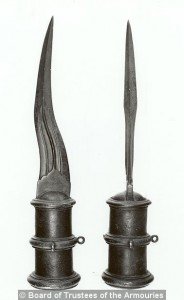Join Tessa Gratton and me as we read the Shahnameh by Abolqasem Ferdowsi. We’re using the Dick Davis translation (Penguin Classics).
Synopsis: Iraj’s grandson Manuchehr goes to war with an army of heroes and sons of kings raised by Feraydun, killing his great-uncles and defeating a demon one-on-one.
TG: This was a lot of war! I enjoyed the descriptions of actual battle – even though it was very poetic and over the top – and also the use of trickery and messengers. I especially liked Qaren pretending to be working for Tur in order to take his castle.
I found some links to elephant armor (though it’s Indian, and more modern than what we’re talking about). This is from the Royal Armouries Museum and I’ve seen the first in person, and it’s awe-inspiring to stand next to.
Here are some elephant tusk swords:

Elephant Sword, 15th–17th century
Indian,
Iron or steel; L. 24 in. (61.2 cm); Wt. 5 lb. 3 oz. (2362 g)
The Metropolitan Museum of Art, New York, Gift of Jeri Garbaccio, in honor of Donald J. La Rocca, 2015 (2015.103)
http://www.metmuseum.org/Collections/search-the-collections/679021
These would be attached to the sawn down end of the tusks.
(Source: https://chalklands.files.wordpress.com/2009/06/elephanttuskswords.jpg)
Since fate came up last week, I thought I’d mention the section where the Evil Brothers try to convince Feraydun that they only acted as fate proscribed. They said they only acted in order to bring what was written to pass. But I don’t think they mean fate as we think of it – I think they really mean “nature.” When they compare themselves to lions and dragons, it seems like they mean they only behaved according to their natures, too, just like last time we were told we shouldn’t be surprised that the moon gives off moonlight. There’s a definite connection between the idea of “fate” and the idea of “nature.” And then again, it was so important to Feraydun that he raise Manuchehr so that the winds of heaven never touch him and even his nurse did not walk upon the earth. He clearly was concerned with keeping the goodness Manuchehr was born with pure, so there might be something to fear from “nurture.”
KE: Here’s a question. I’m continuing to grapple with the notion of farr. While I believe any such concept must have a particular and specific meaning for its own culture, I do also see similar concepts in other cultures. It isn’t really the divine right of kings, which allows for a lot more corruption if all that matters is whether you are designated by God to stand above others, but rather the relationship between the ruler and righteousness (or heaven as it stands in for righteousness and purity). Lose that righteousness and your rule will fail, the crops will wither, and your people have the right to overthrow you. The idea of American Exceptionalism is drawn in part from this conception that some carry a particular purity or divine approval. And how does this intertwine with fate and nature? We know from Jamshid’s example that you can lose farr. But can you gain it, or must it be something given to you or that you possess intrinsically? I have no firm views on this matter; I just find it interesting.
The narrative issues in this section intrigued me. Is there any suspense? Is suspense necessary? Aren’t we sure that Manuchehr will win? Perhaps the point isn’t whether it happens but how it happens. Perhaps it is the anticipation, waiting for the fulfillment of divine justice. One (of many) reasons I find reading outside my familiar narrative landscape important is because it introduces me to different approaches to and goals for narrative.
One last note: I think my favorite detail was the description of the messenger chosen by Manuchehr to bring Tur’s head to Feraydun. What a lovely little portrait of empathy, which I found very touching:
“and when the man arrived his face was filled with shame, his eyes with tears, since he wondered how he could show the severed head of the king of China to the Persian king, because no matter how evil a son might be, or how terrible his crimes, a father’s heart would be wrung by such a sight.”
Next week: The Tale of Sam and the Simorgh (Feb 19)
Previously: Introduction, The First Kings, The Demon King Zahhak, Feraydun and His Three Sons, The Story of Iraj


